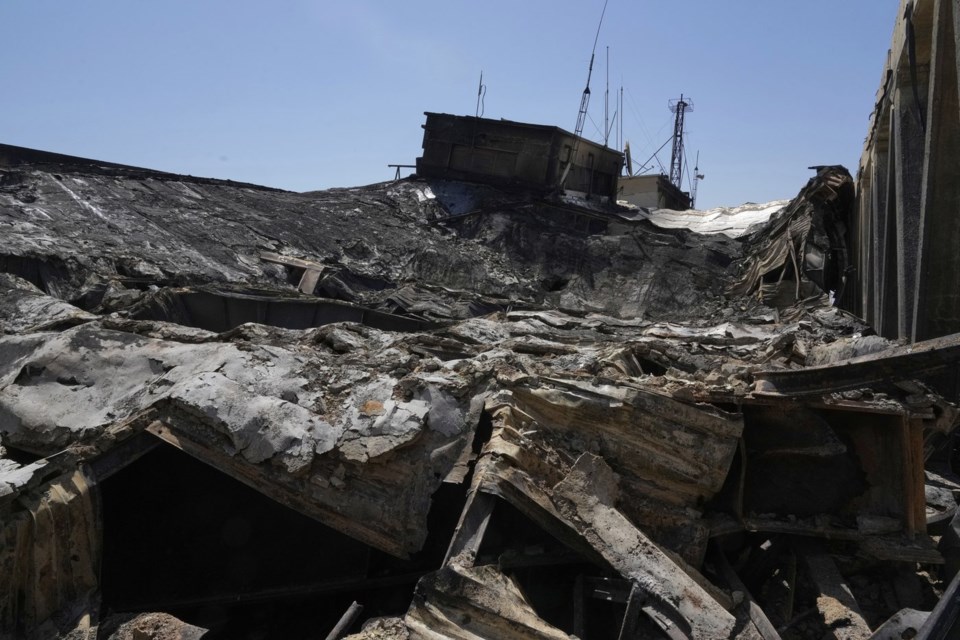A British Columbia professor who is trapped in Iran said that federal officials told him there was "almost nothing" the Canadian government could do to help him and his family.
Simon Fraser University engineering Prof. Shervin Jannesar said in an email that communications were extremely limited and Canadian authorities didn't seem to have a plan to deal with the situation.
Jannesar's wife and two infant children had travelled to Iran before Israel launched strikes against the country, and he told his students that when the conflict began he had no choice but to join them.
The United States entered the conflict over the weekend by bombing Iran's nuclear sites, and with airspace now closed, there's no clear way for the family to get out.
Jannesar said in an email written to The Canadian Press at 3:45 a.m. local time on Sunday during a brief window of internet access that communications were extremely limited and calls could not be received from outside the country.
Jannesar said he managed to call a Canadian government emergency line, but after hours of conversation he was initially told to fill in an online form, despite the lack of internet connection.
"Finally one of the agents kindly did it on phone for me. But after so many back and forth talks they told me that there is almost nothing they can do," Jannesar said.
"Their answer to my question of 'what service (do) you exactly provide in this emergency line?' was something in lines of: 'we are answering your questions! And calls! And if you were not a Canadian we were not answering your questions!"
Jannesar's email came as Foreign Affairs Minister Anita Anand spoke with her Iranian counterpart Abbas Araghchi on Sunday in what appears to be the first official call between Ottawa and Tehran in years, said Dennis Horak, a former Canadian ambassador in the region.
He said Anand might have asked the Iranians for permission to get Canadians out on evacuation flights once the airspace reopens.
Canada closed its embassy in Iran in 2012 and has placed officials in neighbouring countries such as Turkey. Ottawa has four buses stationed at a border crossing between Iran and Turkey.
Putting buses at Iran's borders is probably the only step Canada can take right now, given it has no diplomats in the country to co-ordinate logistics, said Horak, who led Canada's embassy until the Harper government severed relations.
Canadians in Iran have reported difficulties getting information on departures, given restrictions on internet access and they have said congested streets and fuel rationing were making it extremely difficult to get to a neighbouring country.
One of Jannesar's students shared a message from him last week in an online forum, describing the professor's situation, before the U.S. attack.
In that message to his class, Jannesar said he was still trying to provide recorded lectures despite the war conditions.
"As you can most likely hear in my lecture nine recording, it is literally like a war zone with explosions coming around every now and then," he wrote, asking his students for help getting out word about his situation.
A spokesman for Simon Fraser University confirmed that one of its lecturers was stuck in Iran but said it could not provide a recording of the lecture described by Jannesar because access was limited to students.
Jannesar said in his email that Canadian officials he spoke with "were nice and respectful" and he did not want to be "harsh" about them.
"But there are actually no managerial plans behind it and (it's) not clear what they offer. It's not even clear in the wording of their emails that what they do they do or can do," he said.
Jannesar said the internet had been shut down for days before a brief period of access.
The university said a second staff member who was in Iran had managed to cross into Turkey.
"We are closely monitoring the situation, and the safety and well-being of our SFU community members remain our top priority," a spokesman said.
He added that "options for departure from the region are extremely limited" and that the trapped faculty member had been encouraged to contact the university's international health and security provider and Canada's Emergency Watch and Response Centre for consular assistance.
While Iranian airspace is closed, land crossings into Turkey, Armenia and Azerbaijan are possible options for Canadians attempting to leave Iran, according to Global Affairs Canada.
In a Monday afternoon media briefing, Global Affairs Canada said around 5,500 had registered in Iran using the department's database. The actual number of Canadians in any given region is usually much higher, Horak said.
Canadians in Israel, Gaza, the West Bank and Iran have been "advised to remain close to a bomb shelter or a hardened structure away from windows," a Global Affairs Canada web page reads.
— With files from Dylan Robertson in Ottawa
This report by The Canadian Press was first published June 23, 2025.
Nono Shen, The Canadian Press




